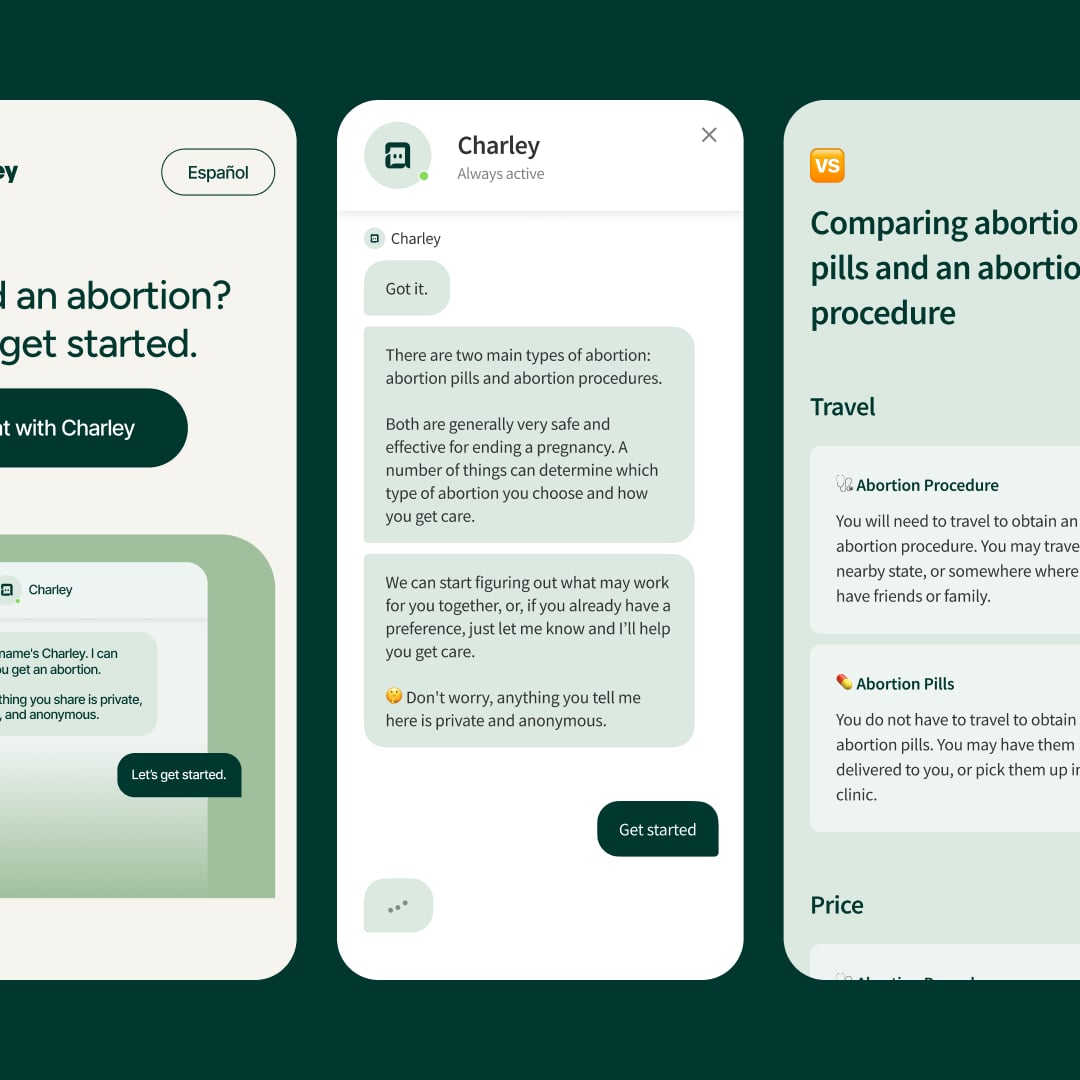
Two pieces of personal information. That’s all you need to give Charley, the chatbot, for extensive guidance on how to get an abortion near you.
In a post-Roe era, where large parts of the US have criminalized the act of providing abortion care, the resource seems particularly useful. But for some living in states with strict laws, giving up any information related to a potential abortion — let alone your zip code and the first day of your last period, the two pieces of information Charley asks for to help users find abortion resources — can come with understandable trepidation.
Kiana Tipton, executive director at Charley, says her team took these worries into consideration when designing the chatbot. “Charley was built with user privacy in mind,” she tells POPSUGAR. It doesn’t use any marketing tracking, like cookies or pixels, Tipton says. It doesn’t sell or share any user data either. In fact, the chatbot reminds users more than once that, “Anything you tell me here is private, secure, and anonymous. If you close this chat window, the conversation will restart from the beginning.” Beyond answering whether you’re interested in info on the pill or a procedural abortion, in addition to a few yes-or-no-type questions, the date of your last period and your zip code is the only personal information required by the bot. “And that’s only to provide the best options for you and your specific circumstances,” Tipton says.
So, How Does Charley Work?
Charley was designed as a privacy-first aggregator of streamlined abortion information. The bot, launched in September, pulls from trusted and pre-vetted sources to provide accurate information in a digestible chat format. Charley does store your IP address (which is traceable to a general location), but only for a short period of time, then it is encrypted and deleted. Ultimately, the bot does not save any user information, which would come in handy if the bot were to be subpoenaed by a court of law. “Charley can be subpoenaed, but the fact that we don’t collect any PII [personal identifiable information], don’t use trackers, and that we delete all data makes it exceedingly unlikely that we’d have any user data or records to turn over if we receive a subpoena,” Tipton says.
What the team behind Charley does track is the number of people using the bot and the number of people that are on the ChatwithCharley.org page, she says. They can also track the number of people that have come to Charley using what’s called “host sites,” or sites that embed the chatbot. It’s currently embedded on a number of different abortion resource and reproductive rights pages, including the National Women’s Health Network (NWHN). “The two pages that host the Charley chatbot on our website, which provide information on how to access abortion care, are consistently the most clicked and interacted with pages on our website and have been for years,” says Adele Scheiber, communications director at NWHN. She says they have about 15,000 to 20,000 people interacting with those pages and with Charley every month.
Who Is Behind Charley?
Charley was created by several big names in the reproductive rights space, including organizations like Plan C, ineedana.com, the Miscarriage + Abortion hotline, as well as people like Cecile Richards, the former president of Planned Parenthood. In terms of funding, Tipton says Charley is a nonprofit and does not make any money from the visitors using the bot, nor do any of their 11 host sites pay them to live on the site. Instead, they’re funded by philanthropic donors and partnership organizations.
 Image Source: Charley
Image Source: Charley
Putting Charley to the Test
In order to really get a feel for the chatbot, I started my own conversation with Charley. I played out several different scenarios, varying my location and gestational age to see how the bot would respond. In one conversation I acted as 13-week-pregnant abortion seeker in one of the most restricted states in America: Texas. I wanted to see how the bot would advise someone who lives in a state where abortion is completely banned (with the exception to save the pregnant person’s life and to prevent serious risk).
The bot starts out with an introduction, written in both English and Spanish, establishing the purpose of our chat, expected duration, and the anonymity of the conversation. “Chat with me to get up-to-date information on how to get an abortion. We can talk as much as you need, but most conversations take 15-20 minutes,” Charley states, before reassuring me for the first time that the conversation is private, secure, and anonymous, and prompting me to pick a preferred language. Then it asks if I’m interested in abortion pills or a procedure, followed by the date of my last period. If you’re not sure, you’re given a range to choose from: 6 weeks or fewer, 6-11 weeks, 12-15 weeks, all the way to 24+ weeks. Finally, the bot asks for a zip code. “Currently, clinics aren’t allowed to do abortions in Texas. But don’t worry! You may still have options, and I can help,” Charley stated after learning I was from El Paso, Texas.
From there, Charley launched into a step-by-step comprehensive guide to getting me the care I desired, offering up information on everything from an out-of-state abortion clinic options (my nearest option was suggested to be in Santa Teresa, New Mexico about an one-hour drive away) to potential costs, abortion funds, pain medication, and hurdles I could encounter depending on how far along I was.
“If you think about it, especially with the laws that are coming down, deputizing the public in civil suits and turning neighbor against neighbor, like in Texas, talking to a person might actually be more dangerous.”
There was even a warning chat about crises pregnancy centers, which are designed to prevent people from getting an abortion.
Admittedly, it’s a lot of information to process at once. But it beats combing the internet for a bunch of separate queries, worried about whether your IP address is being saved or you’re getting the most up-to-date information. Instead, Charley draws on a database of abortion providers compiled by one of the bot’s co-creators, ineedana, which is updated daily, per Tipton. It also collects data from Abortion Policy API, a tool that analyzes and tracks abortion access across the country. “So every time you use Charley, you can be sure that the information that you’re getting is not only accurate, but up to date, which is becoming more and more difficult, and I think will continue to be difficult in this next year, as we see new bills and restrictions going to the court,” Tipton tells POPSUGAR.
How Charley and Other Emerging Tech Can Help Push Access Forward
For those who may be fearful of turning to tech like Charley, Scheiber says that in today’s post-Roe era, chatting anonymously to the bot may be your safest best. “If you think about it, especially with the laws that are coming down, deputizing the public in civil suits and turning neighbor against neighbor, like in Texas, talking to a person might actually be more dangerous,” Scheiber tells POPSUGAR. We’ve seen this kind of deputizing play out in publicized cases like that of Brittany Watts, the 33-year-old Black woman who was criminally charged after enduring a miscarriage and visiting a Catholic hospital where a nurse would later report her to the police.
Tipton views tech like Charley as just the beginning of the wider dismantling of inequitable systems — a “hopeful pathway where we can start using technology to specifically build products that work to help more marginalized groups and those most impacted by abortion bans and restrictions,” she says.
“I think that there are a lot of people in tech that have the ability and have the power to be able to create more tools and more products and more tech that dismantle inequities that currently exist,” Tipton says. “I think that we’re at this really important point in history, where we need more people to do the brave thing.”
Image Source: Getty / PM Images
